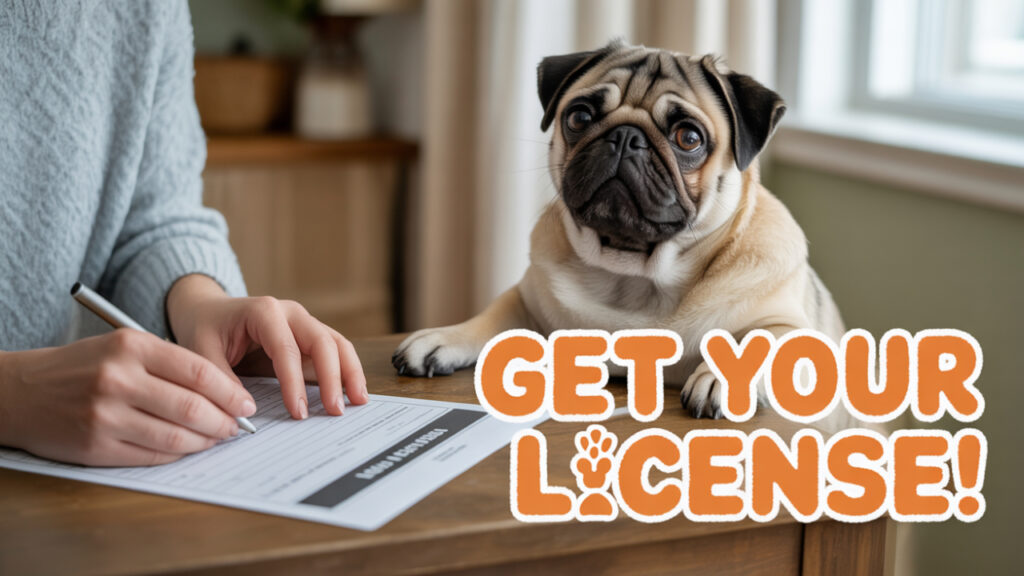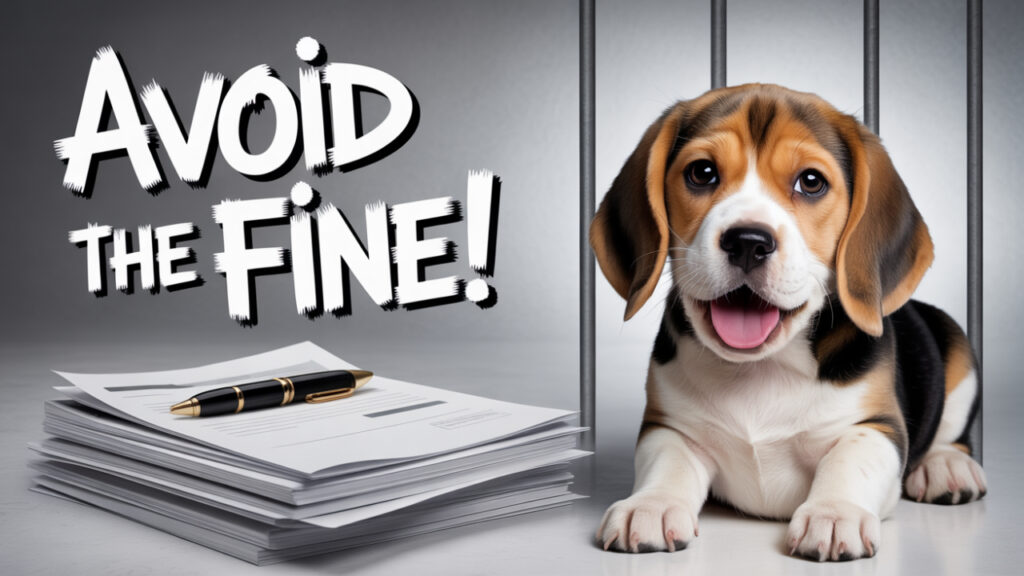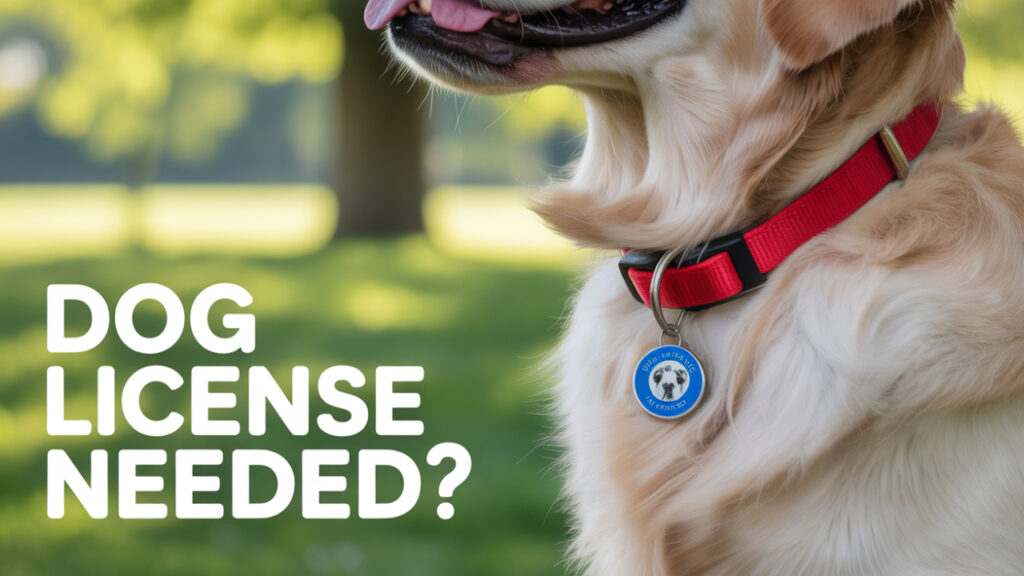Do you need a license for a dog. Most cities and counties will require pet owners to register their dogs to encourage responsible ownership and maintain public safety. Licensing typically requires showing vaccine documentation and paying a small fee. Certain locations might have breed or size restrictions. Licensing assists local municipalities in monitoring pet populations and provides opportunity for lost dogs to be returned home. Knowing your local laws is important, and it’ll keep you from being fined. Here’s what you need to know about dog licensing and why it matters.
Why Do You Need a Dog License?

For one thing, it’s usually mandated by local law. While this process ensures your compliance with the law, it is important for public health and community safety.
Legal Mandate
Dog licensing laws are different everywhere. Most municipalities require dogs over three- to four-months of age to be licensed. There are almost always deadlines to get a license — often within 30 days of acquiring a dog. If you don’t meet these licensing mandates, you can end up with fines or late fees–up to $25 in places like San Bernardino County.
Public Health
License your dog helps keep tabs on rabies shots, which is definitely an important public service. This reduces the risk of rabies outbreaks, since local officials insure vaccination compliance via licensing. Licensed dogs are less likely to spark public health crises, making communities safer.
Community Funding
The revenues from dog licenses go directly to locally animal control. These dollars back shelters and programs that reunite lost pets with their owners. Your licensing supports animal welfare in the community at large, keeping slots open for needed services.
Pet Recovery
A dog license serves as official ownership documentation–speeding pet return. Plus, because licensed dogs are easier to identify and return if lost, fewer stray dogs end up in shelters. Being licensed means your dog is more likely to be returned to you if he or she is lost.
Proof of Ownership
Dog license requirements vary greatly from country to country and state to state. Some areas have stricter rules in place, particularly for certain breeds that may be subject to extra licensing. With travel for dogs going to new jurisdictions, licensing is often a factor as well.
Global Licensing Variations
Dog licensing rules are wildly different wherever you go. Knowing the distinctions are key to being a responsible dog owner.
Negligence to license your dog can result in heavy fines. In some jurisdictions, the fines for being unlicensed are nominal, while in others they’re large. For example, a dog owner in NYC may incur a fine of up to $200 for an unlicensed pet. Certain small localities might charge a nominal fee, but multiple infractions increase the penalties. These costs can accumulate, particularly when factoring in late registration fees or penalties for ignoring reminders.
Unlicensed dogs are considered strays and this can be catastrophic. Shelters usually have much smaller holding periods for unlicensed animals — sometimes only a few days. This implies that a licensed dog that gets lost is more likely to find their way back home than an unlicensed canine. For instance, in Los Angeles, any unlicensed dog can be adopted out or euthanized within five days unless redeemed, whereas licensed dogs generally receive a week or more. This underscores the significance of not only licensing but contact info updates.
No license means it’s hard to get lost pets home. If a dog is license-less, shelters can’t confirm ownership. This can cause un-needed stress and extended separation between pets and their owners. In fact, having proof of licensing can often facilitate return, as shelters give priority to licensed animals for return.
Violation of licensing laws can cause pet owners legal problems. In certain regions, multiple violations become misdemeanor charges that could prohibit the owner from adopting or possessing pets in the future. Not to mention that legal action can paint you in a bad light within the community, leaving you with a bad reputation as a dog owner.
Consequences of Non-Compliance

You’ll want to read to learn about the consequences of not having a dog license. Your local authorities issue dog licenses, and reading up on them is important. Every region is going to have its own rules, so it’s good to know who to call in order to avoid headaches.
There are different ways to apply for a dog license, such as online and in person. Most cities provide nice online easy systems, so it’s even easier for owners to apply from the comfort of their couch. In-person applications could mean stopping by local offices or animal shelters. Knowing your options can simplify licensing.
After the application is processed, dog owners are provided with a distinctive identification tag and a paper certificate. This tag is important, it’s your license and identification for your dog. Every licensed dog should have their tag affixed on their collar. At least then, if the dog gets lost, it can easily be returned to its owner.
Failure to license a dog is cause for citation and possible fines. For example, in a lot of places, owners of dogs older than four months must license them and have proof of rabies vaccination. If they don’t, then the owner can be penalized. In certain cities like Temple City, dogs must be spayed or neutered and micro-chipped, which is subject to additional fines if not done.
If a dog is unlicensed 30 days after ownership or a rabies vaccination, late fees can be applied. This just puts an unnecessary financial squeeze on the owner. If any owner is found to be in non-compliance, they could be subject to pay the licensing fee plus late charges. Knowing these rules is essential for good pet stewardship.
The Licensing Process
The dog licensing process is different in many places, but the following main points address most locations. Knowing these requirements can make your experience easier and keep you on the right side of local laws.
Requirements
Before you can get your license, you need to collect these documents. Most demand rabies vaccination records and sometimes spay and neuter certificates. Having these prepared can speed up your application.
Next, fill out the dog license application. It is important to give a truthful description about yourself and your pet, such as breed, age and any identifying characteristics.
Mind age restrictions, too, which generally begin at three to four months for licensing. Certain localities might impose extra rules for certain breeds, especially those deemed dangerous. Doing some research of your local laws can help clear these points up.
Choose how you want to apply. Most jurisdictions provide online options, others have you send the paperwork by mail. Making sure everything needed is included with your application will save delays.
Application
Dog license fees range widely from one jurisdiction to another. It’s important to know about these fees so that you can budget accordingly. For example, spayed or neutered dogs typically get a discount on their licensing fees. Annual fees are anywhere from $10 to $15 for altered dogs, and up to $60 or more for those unaltered.
Watch out for those late fees if you don’t renew your license on time! These fees contribute to the cost and are frequently unnecessary when caught early.
Costs
The future of dog licensing is digital tags to boost identification. These tags have the potential to facilitate the reunion of lost pets with their owners. Let’s get out of your hair about that and first understand what it means to be a data privacy dog owner.
There are ethics involved with dog licensing as well. Unlicensed pets are sometimes treated more harshly by authorities, resulting in undue suffering to the pet and their owner.
Keeping up with ever-changing licensing trends for pets can promote responsible pet ownership. Knowing your dog owner responsibilities makes for a happier community.
Beyond the Basics
There’s more to dog licensing than a tag. It covers the impact of technology, data privacy, and ethics dog owners have to confront for responsible pet care.
Digital Tags
Digital tags are a new way to track licenced dogs, with advantages including immediate identification and enhanced recovery. These tags typically have information embedded in them that local authorities can access immediately, improving the effectiveness of pet recovery systems. For example, if a lost dog wanders in, a quick scan delivers instant ownership information–allowing the reunification process to begin seamlessly.
Protecting personal information is essential. Owners need to know about licensing data use by local authorities. Transparency is key, because if you’re aware of how your data is managed it can avoid it being misused. It’s dangerous to share pet ownership info. Intrusions or breaches could compromise your privacy. Campaigning for responsible data license systems can save both pets and pet parents.
Data Privacy
Licensing needs to put ethical issues front and center. They have their advantages in controlling feral populations and providing a measure of responsible ownership, but they require a certain degree of adherence from dog owners. This requirement can put a strain on community resources, particularly in communities with high populations of strays.
The line between regulation and good pet ownership is fine. Talking about these problems can yield better policies that help animals and society. Owners need to realize their part in licensing laws and the big picture.
Ethical Considerations
If a dog tag comes off, you need to act immediately. By reporting it to local authorities or animal control, you’re avoiding any potential confusion about ownership. Knowing how to replace a lost dog license tag is key. Maintaining records of your dog’s licensing information makes recovery a breeze if your pet gets loose.
Microchipping is another option to think about. This permanent solution to traditional tags ensures your pet can be identified if tags become lost.
When Tags Go Missing
When a dog license tag goes missing, it can be a hassle, but knowing how to replace it can make things easy. Whether your pet lost a tag on a walk or chewed one to shreds at home, understanding how to tackle the replacement process is a necessary part of being a responsible pet parent.
Learn what to do when you need a new dog license tag. Usually, this starts with your local animal control or licensing office. Most municipalities have online forms, that you fill out and submit virtually. In other times, a trip by the office may be necessary. Best to check your local laws, as these processes differ significantly.
Have your licensing and id proof ready to request a replacement. This typically involves presenting old proof of your dog’s license, like the original tag number, in addition to your ID. Certain venues might even request vaccination records to ensure all is in line with local regulations. Maintaining these papers in an orderly, accessible fashion can help streamline the replacement procedure.
Know what they charge for a replacement tag for loss or damage. Although some places will give you replacements for free, while others will charge you. This fee can be anything, from piddling amounts on up, again, depending on local laws. I’d be wise to ask about these fees up front, lest they catch me unawares during the replacement.
Have a replacement tag ready so your dog’s tag is always up to date. An additional tag is great to have on hand if your pet is an avid explorer or social butterfly. It’s a simple precaution that can save you time and hassle if the main tag ever goes missing once more. Maybe stow the spare somewhere at home, or on your dog’s collar in an enclosed pouch.
Conclusion
There are several advantages to licensing your dog. It protects pets and assists communities in managing stray animals. Because each locale has its own regulations, understanding your location’s specific requirements is essential. Non-compliance can result in fines or other sanctions. The licensing is easy and usually just paperwork. Maintaining tags current helps your pet returns property if ever he/she will get dropped.
Licensing your dog demonstrates responsibility. It fortifies the connection between you and your furry friend and makes the world a safer place for all. Discover your local laws, collect the paperwork, and do your part to keep your pooch and community protected.
Frequently Asked Questions
Do all countries require dog licensing?
Not every country has dog licensing. Requirements differ considerably. You will have to check your local laws to find out.
What are the benefits of licensing your dog?
Licensing assists in reuniting lost pets with their owners. It keeps your dog vaccinated and in line with local regulations, contributing to community safety.
How much does it cost to license a dog?
Licensing costs vary by location. Typically, fees are between $10-$50. Verify fees with your local government.
How often do I need to renew my dog’s license?
Most dog licenses are renewed yearly. Certain locations provide multi-year licenses. Always check with local ordinances for precise renewal times.
What happens if I don’t license my dog?
If you don’t license your dog, you can get fined or worse. It can make things more difficult if your dog becomes lost or gets into an incident.
Can I license my dog online?
Online licensing is available in a lot of jurisdictions. Go to your local government’s site and check if they provide this service in your area.
What should I do if my dog’s license tag is lost?
If your dog’s license tag is lost, reach out to your local licensing authority for a replacement. Maintaining your dog’s up-to-date information is essential for their safety.
Key Takeaways
- As mentioned earlier, licensing your dog is usually mandatory by law and maintains a record of rabies vaccinations.
- Each county has different laws about dog licensing, but it usually has to be done when they are three to four months old.
- Licensing fees support local animal control, shelters and animal welfare efforts – which helps the entire community.
- Dog license acts as proof of ownership, it is more likely to get lost pets back to their owner, and decreases the number of strays.
- Keep an eye out for the exact licensing regulations and deadlines in your location to prevent fines and hassles.
- Think digital tags and microchipping for added identification and a straightforward recovery process if your dog gets lost.





